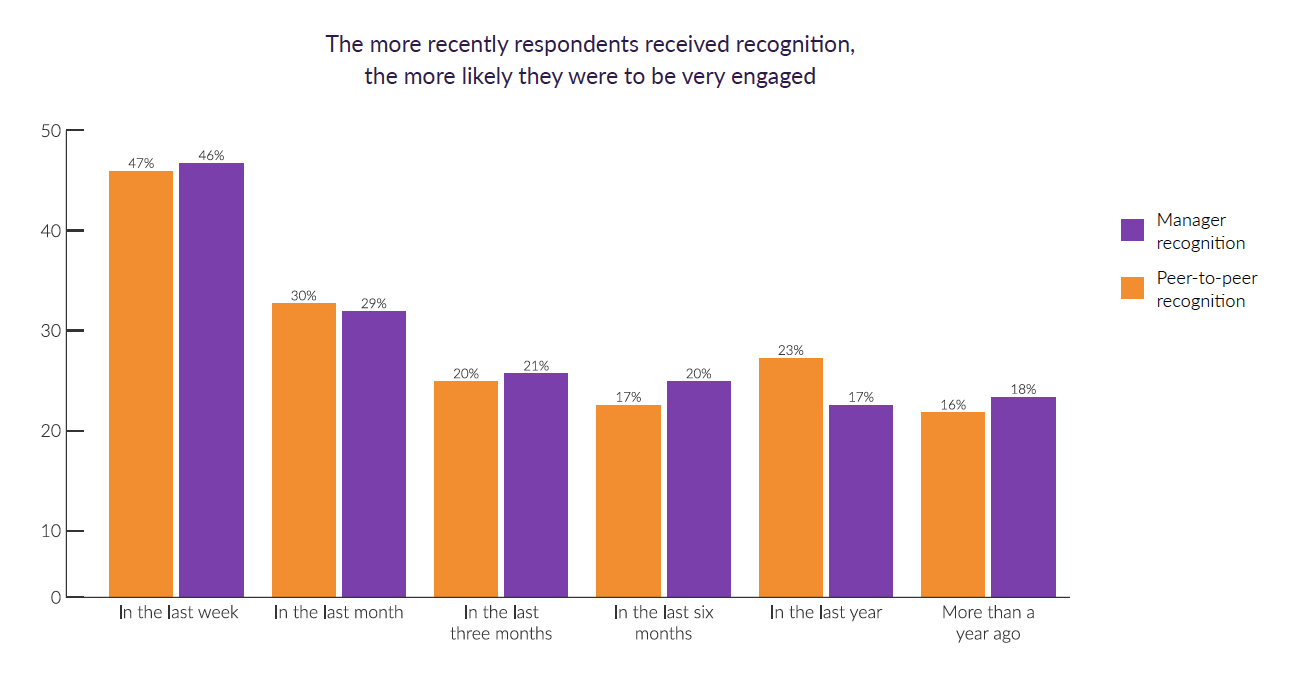Almost half of all employees feel unrecognized during COVID-19, according to the latest report from Achievers Workforce Institute. The Achievers Culture Report surveyed more than 1,100 people and found that 40 percent say they aren’t recognized enough during COVID-19.
That number is even higher in industries such as retail, where 48 percent of respondents feel unrecognized.
This should be a wake-up call for managers and organization leaders who may think their response to the COVID-19 pandemic has gone smoothly. Recognition is directly tied to engagement, which drives productivity, commitment, and discretionary effort. Feeling unrecognized is a key driver for disengagement.
Companies need to look at their recognition programs and practices to see where there are opportunities to improve and iterate. Training managers in appropriate, effective recognition would be a great starting point toward improving recognition across the organizations.
Key findings on employee recognition
We asked when people last received formal recognition, and more than two-thirds reported that they hadn’t received any recognition in the last month.
Almost one in five respondents (19 percent) have received recognition from their peers and managers in the last week, and a further quarter have received it in the last month. However, more than a third had only received recognition in the last six months or more from their peers (37 percent) or managers (38 percent). That’s one in three employees who have not received recognition for their work within the last three months. Would you feel appreciated if that was the case?
One-third (35 percent) of people say more appreciation for their work would help them feel more supported during COVID-19. This is the top answer when asked how organizations can better support their employees, tied with work-life balance.
Frequency matters
We know that frequent recognition matters. According to a recent research brief from Brandon Hall Group, there are significant business advantages to frequent recognition.
The research shows that organizations with more frequent recognition:
- Rate their culture of recognition 34 percent more highly than other organizations
- Are 41 percent more likely to see increased employee retention
- Are 34 percent more likely to see increased employee engagement
“For a culture of recognition to develop, employees need to be recognized by both managers and peers for a wide variety of meaningful contributions on a regular basis. Extrinsic rewards are good forms of recognition, especially for performance progress or milestones. But non-monetary, timely recognition for meaningful contributions is particularly important to build the culture,” according to the Brandon Hall Group research brief.
A clear correlation between recognition and engagement
This chart below shows how many respondents said they were “very engaged” compared to when they last received recognition. As you can see, almost half of respondents who received recognition in the last week are very engaged, compared to a third of those who received recognition in the last month. Just 16 percent of those who received peer recognition more than a year ago are engaged. Those who received recognition in the last week were significantly more engaged than those who did not.

The Achievers Culture Report
This draws a clear line between recognition and engagement. The more recently someone received recognition, the more likely they are to be highly engaged. This aligns with other Achievers research, which shows that whenever recognition doubles, overall engagement is expected to increase by five percentage points.
This should be considered a call to action for executives and HR leaders. If you want an engaged, active employee base, you need to be working towards monthly recognition at a minimum.
Learn more about engaging your employees through COVID-19 in the latest Achievers Workforce Institute research study, The Culture Report.


